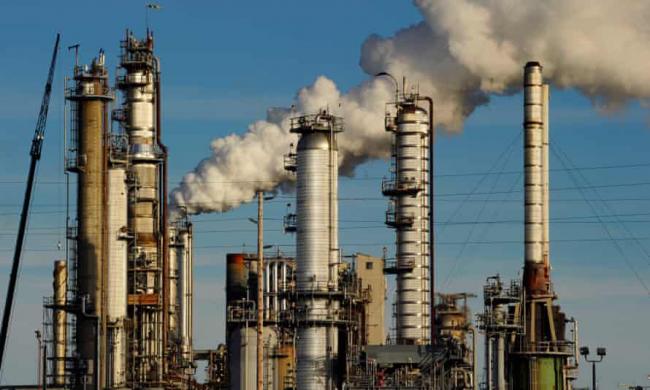Articles Menu

July 28, 2021
A county in Washington state has become the first such jurisdiction in the US to ban new fossil fuel infrastructure, following a lengthy battle over the impact of oil refineries on the local community.
In a vote on Tuesday night, Whatcom county’s council unanimously passed a measure that bans the construction of new refineries, coal-fired power plants and other fossil fuel-related infrastructure. The ordinance also places new restrictions on existing fossil fuel facilities, such as a requirement that any extra planet-heating gases emitted from any expansion be offset.
Whatcom county is located in the far north-west corner of Washington state, next to the Canadian border and abutting the Salish sea. The county hosts two of the state’s five oil refineries, with BP and Phillips 66 overseeing facilities at the Cherry Point complex that refines much of the oil from Canada and Alaska that is then distributed along the US west coast.
“There will be no new refineries, they won’t be able to get permits to export their product and while we will still have these dinosaur facilities already here it will be more challenging for them to expand,” said Todd Donovan, who is serving his second term on the council and was a major proponent of the new rule. “The future is clearly in renewable energy.”
The ban is the culmination of a years-long fight to curb fossil fuel activity in the county to help address the climate crisis and reduce air pollution. A huge coal export facility, which would have moved 50m tons of coal a year, was proposed for Cherry Point but was eventually blocked in 2016 following fears raised by the local Lummi Nation that it would have destroyed fisheries.
Donovan said that people in the county had become increasingly alarmed about the environmental fallout of fossil fuel activity, including impacts upon fisheries and local orca whales.
“We just had our hottest day on record a few days ago, the salmon are disappearing, the glaciers are melting so much that you look at Mount Baker near here and you see bare rock where there used to be ice,” he said. “With all the fires and the heat, people are connecting the dots that this is climate change caused by fossil fuels. It has galvanized them.”
The fossil fuel industry previously attempted to block any new restriction upon its activity in Whatcom county, pouring money into local elections and claiming that the move would cost several thousand jobs. More recently, however, the industry entered into talks over how the new restrictions would work.
“Washington’s energy industry believes that ongoing capital investment into existing refinery operations is necessary to ensure the safe, state-of-the-art, clean production of transportation fuels,” Holli Johnson, manager of north-west external affairs for the Western States Petroleum Association. Johnson added that the association’s members were a “primary driver of economic growth and prosperity” and help fund local schools and healthcare facilities through tax revenues.
This relatively liberal enclave on Washington coast may be the first to call time on the fossil fuel industry but environmentalists hope it will spur other jurisdictions to do the same, then pushing the federal government to rapidly phase out oil, coal and gas in order to avoid worsening the ravages of the climate crisis, which is fueling huge heatwaves, drought and fire across the US west, along with flooding from Germany to China.
To date, Joe Biden’s administration has paused new oil and gas drilling on public land and attempted to accelerate the growth of renewable energy but has declined to set an end point for fossil fuels. Republicans, meanwhile, remain staunch defenders of the industry.
“This is a huge moment, it challenges the narrative that has been the default of the past century that new fossil fuel infrastructure is inevitable and will always be built,” said Matt Krogh, a campaigner at the environmental group Stand.earth who lives in Whatcom county. “There is a tipping point where if enough communities take action we will see Washington DC take notice.”
[Top photo: The Tesoro oil refinery in Washington state. Photograph: Kevin Schafer/Getty Images]